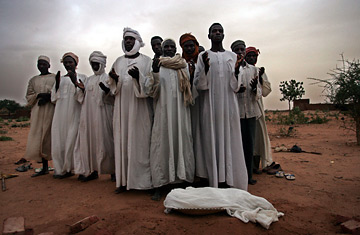
Relatives mourn over the body of 1-year-old Ali, who died of malnutrition in a refugee camp in El-Geneina in Darfur, Sudan.
The arid, rock-strewn plains of Darfur, in western Sudan, have never been an easy place to live. The region's people have survived for centuries in a delicate accommodation with nature and with one another that allows their farmers to till the fertile valleys and their nomadic grazers to migrate between the sandy dry north and the south, which explodes with green after the rains every August. In basic terms, Darfur's farmers are black Africans and its nomads Arab, but centuries of intermarriage have blurred the distinctions: the vast majority of Darfurians are black, Muslim and speak Arabic.
Over the past two decades, Darfur's fragile balance has broken down. Drought has forced the Arab nomads to graze their cattle and camels on farming land, leading to occasional clashes. Arms from neighboring conflicts have flooded in, turning simmering tensions deadly. In April 2004 a rebel group calling itself the Sudan Liberation Army (SLA) attacked the airport in the town of El Fasher, killing 75 Sudanese government soldiers. The rebels, who came from farming tribes and had conducted a series of smaller raids over the previous year, said they were protesting the Sudanese government's long neglect of Darfur and its favoritism towards Arabs.
Determined to put down the rebellion quickly, the government in Sudan's capital, Khartoum, decided to arm the region's Arab nomads. The nomads, spotting a chance to grab land and additional livestock, signed on to the counterinsurgency enthusiastically. With the support of the Sudanese military, the nomads began a campaign of ethnic cleansing, attacking not only SLA fighters but razing villages and killing civilians who, the government claimed, were helping the rebels.
Locals called the Arab fighters Janjaweed, which loosely means "devils on horseback." Janjaweed methods are brutal and effective. A dozen or so men ride into a village on horses or camels, or in SUVs, kill the men and boys, rape the women, loot and burn huts and mosques, and slaughter or steal livestock. The rebels have also been guilty of raids, massacres and kidnappings. But survivors, aid workers and human rights investigators say most attacks are by the Janjaweed, whose operations are often coordinated with the Sudanese military, which provides troops, vehicles and air support in the form of bombers or helicopter gun ships.
By the summer of 2004 the Janjaweed had killed tens of thousands of people. The fighting had forced a million more from their homes and into ramshackle camps on the edges of Darfur's biggest towns or across the border in Chad. Khartoum denied that it was backing the militias but the United Nations and Western powers, who were finally getting around to noticing what was happening in Darfur, held Khartoum responsible for the killing and demanded that the regime rein in the Janjaweed.
The U.S. Congress and then Secretary of State Colin Powell called the campaign of killing genocide. "Genocide has been committed in Darfur and...the Government of Sudan and the Janjaweed bear responsibility—and genocide may still be occurring," Powell told a senate committee on foreign affairs in September 2004.
Belated, limited U.N. sanctions against Khartoum and Janjaweed leaders have had little impact on the killing and violence. China, which has big investments in Sudan's oil industry, has regularly resisted more punitive sanctions. An April 2006 ceasefire offered some hope, but fighting soon resumed and grew so bad by the summer that aid agencies threatened to abandon their humanitarian efforts because it was too dangerous for them to work in Darfur. The crisis began to spill over Sudan's borders into neighboring Chad and the Central African Republic, threatening a regional conflagration.
Despite the aid effort, worldwide protests against the genocide—the issue has become a cause celebre on U.S. university campuses and among Hollywood stars like George Clooney—and calls for military intervention, the killing goes on. Sudan's government rejected a proposal to bring in a U.N. peacekeeping force to bolster the brave but undermanned and under-resourced African Union troops who have tried to keep the peace since late 2004. Until Khartoum decides to end to the killing, or the world intervenes, the slaughter will continue.
—Simon Robinson
